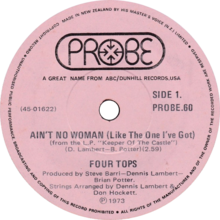| This article needs additional citations for verification. Please help improve this article by adding citations to reliable sources. Unsourced material may be challenged and removed. Find sources: "Ain't No Woman" Like the One I've Got – news · newspapers · books · scholar · JSTOR (October 2016) (Learn how and when to remove this message) |
| "Ain't No Woman (Like the One I've Got)" | ||||
|---|---|---|---|---|
 Side A of the New Zealand single Side A of the New Zealand single | ||||
| Single by Four Tops | ||||
| from the album Keeper of the Castle | ||||
| B-side | "The Good Lord Knows" | |||
| Released | January 1973 | |||
| Recorded | 1972 | |||
| Studio | ABC, Los Angeles, California | |||
| Genre | Soul | |||
| Length | 3:04 | |||
| Label | ABC/Dunhill | |||
| Songwriter(s) | Dennis Lambert Brian Potter | |||
| Producer(s) | Dennis Lambert | |||
| Four Tops singles chronology | ||||
| ||||
"Ain't No Woman (Like the One I've Got)" is a song written by Dennis Lambert and Brian Potter, released as a single by the Four Tops on the ABC/Dunhill record label, from the album Keeper of the Castle. It peaked at number four on the U.S. Billboard Hot 100 the weeks of April 7 and 14, 1973, number one on the Cash Box Top 100 the latter of those two weeks, and became a gold record.
The song was originally recorded by the singing trio of Hamilton, Joe Frank & Reynolds and released on their 1972 album, Hallway Symphony.
The Four Tops' hit version was led by longtime singer Levi Stubbs, and included special co-lead spots by the other Tops, Lawrence Payton, Renaldo "Obie" Benson and Abdul "Duke" Fakir, in that respective order during the chorus. The words tell about the love a man feels for the woman with whom he is having a relationship.
It was the Four Tops' second single release on ABC after leaving Motown in 1972, and became their most successful post-Motown top 40 hit, reaching number four on the US Pop Singles chart. It was also another big success for the group on the US R&B Singles chart, where it peaked at number two.
Billboard said that "Levi Stubbs' lead vocal carries the quartet though a moving arrangement which has pop as well as soul overtones. Nice mellow strings give the tune soft lilt as the tale of fond affection unravels." Record World said "Levi Stubbs' voice still brings chills to the spine. Ain't no sound, like the one they've got!"
Chart performance
Weekly charts
| Chart (1973) | Peak position |
|---|---|
| Canadian RPM | 11 |
| U.S. Adult Contemporary | 14 |
| U.S. Billboard Hot 100 | 4 |
| U.S. Cashbox Top 100 | 1 |
| U.S. R&B | 2 |
Year-end charts
| Chart (1973) | Position |
|---|---|
| U.S. Billboard | 60 |
| U.S. Cash Box | 38 |
Certifications
| Region | Certification | Certified units/sales |
|---|---|---|
| United States (RIAA) | Gold | 1,000,000 |
|
Shipments figures based on certification alone. | ||
Other cover versions
Additional interpretations include those by: Pete Marquez, Bloodfire Posse; Mel Brown; East Coast Band; The Friends of Distinction; Home T; Kashif; Louie; Johnny Mathis; and Melvin Sparks. The song was later reinterpreted by Jay-Z and Foxy Brown in their 1996 hit, "Ain't No Nigga".
Personnel
- Lead and background vocals by Levi Stubbs, Lawrence Payton, Renaldo "Obie" Benson and Abdul "Duke" Fakir
- Produced by Dennis Lambert
- Tony Terran - trumpet
References
- The Hot 100, Week of April 7, 1973 – Billboard. Retrieved December 26, 2020
- The Hot 100, Week of April 14, 1973 – Billboard. Retrieved December 26, 2020
- ^ "Cash Box Top 100 4/14/73".
- "Radio Action and Pick Singles" (PDF). Billboard. January 27, 1973. p. 125. Retrieved 2023-03-24.
- "Hits of the Week" (PDF). Record World. February 3, 1973. p. 1. Retrieved 2023-03-24.
- "Item Display - RPM - Library and Archives Canada". Collectionscanada.gc.ca. Archived from the original on 2015-11-10. Retrieved 2016-10-08.
- "Top 100 Hits of 1973/Top 100 Songs of 1973". Musicoutfitters.com. Retrieved 2016-10-08.
- "The CASH BOX Year-End Charts: 1973". Retrieved 2016-06-25.
- "American single certifications – Four Tops – No Woman". Recording Industry Association of America. Retrieved July 8, 2024.
| Four Tops singles discography | |
|---|---|
| 1960s |
|
| 1970s |
|
| 1980s |
|